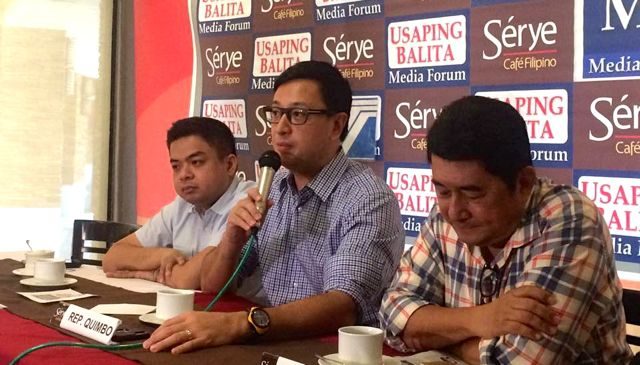SUMMARY
This is AI generated summarization, which may have errors. For context, always refer to the full article.

MANILA, Philippines – The chairman of the House ways and means committee on Thursday, November 12, defended the proposed imposition of excise tax on sugar-sweetened beverages, saying it would not affect the local sugar industry.
“In all the studies that we have seen and conducted with the sweetened-beverage tax, the sugar industry will not in any way be affected,” Marikina Second District Representative Romero Quimbo said in a media conference.
Quimbo explained that the output of domestic sugar farmers remain a “small segment” and “not even enough to be able to accommodate the needs of the industry.”
“Maraming iniimport pa rin (Much more is still being imported)….In fact bulk of those (beverages that) will be taxed are artificially-sweetened,” he said.
The Beverage Industry Association of the Philippines (BIAP) earlier criticized the proposed P10 ($0.22) per liter charge on sugary drinks as”anti-poor” and “antibusiness.”
BIAP said the excise tax would bring down the industry’s sales, and would eventually lead to retrenchment.
Former Negros Oriental 1st District representative Juanito Paras, who was at the forum, echoed the BPIA’s concerns and mentioned that the sugar industry already sees a “growing unemployment rate now.”
Paras stressed that the industry employs a large number of workers since sugar production is labor-intensive.
Negros Oriental is among the country’s top sugar producers.
Like sin tax
Paras also said Congress should have looked into other revenue-generating measures as the sugar industry is already considered a vulnerable industry. He also said there has been no proof that sugar intake does directly cause diabetes.
“It has not been proven that diabetes is directly caused by sugar. There are other [causes like] obesity,” he said.
But Quimbo explained the law, anchored primarily on promoting good health, seeks a change of habit among Filipinos who resort to sugar-sweetened drinks instead of water or healthier alternatives.
He said the implementation of the sin tax law, which also seeks to promote better health, curbed the number of smokers among the youth.
“While overall, 1.8% lang ang total reduction [in the number of smokers], ang pinakamalaking accomplishment ay ‘yung hindi pagkakaroon ng dagdag na new smokers galing sa mga teenagers.“
(While overall, the total reduction [in the number of smokers] only amounts to 1.8%, the biggest accomplishment is there was no increase in new smokers among teenagers.)
The Department of Finance expects P10.5 billion ($223.44 million) annual revenues from the proposed tax. (READ: House committee approves ‘soft drinks’ tax)
This amount, Quimbo said, will be used primarily for health-promotion projects.
“We are pushing for the development of potable [water] systems in schools or develop milk that is more affordable. That is where the money will go,” he added. – Rappler.com
US$1 = P47
Add a comment
How does this make you feel?
![[In This Economy] A counter-rejoinder in the economic charter change debate](https://www.rappler.com/tachyon/2024/04/TL-counter-rejoinder-apr-20-2024.jpg?resize=257%2C257&crop=267px%2C0px%2C720px%2C720px)
![[Vantage Point] Joey Salceda says 8% GDP growth attainable](https://www.rappler.com/tachyon/2024/04/tl-salceda-gdp-growth-04192024.jpg?resize=257%2C257&crop_strategy=attention)
![[ANALYSIS] A new advocacy in race to financial literacy](https://www.rappler.com/tachyon/2024/04/advocacy-race-financial-literacy-April-19-2024.jpg?resize=257%2C257&crop_strategy=attention)


There are no comments yet. Add your comment to start the conversation.